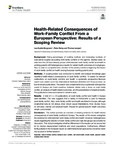Health-Related Consequences of Work-Family Conflict From a European Perspective: Results of a Scoping Review
Borgmann, Lea-Sophie
Rattay, Petra
Lampert, Thomas
Background: Rising percentages of working mothers and increasing numbers of dual-earner couples are putting work-family conflicts on the agenda. Studies based on data from the US have already proven a link between work-family conflict and health in working parents with heterogeneous results for certain health outcomes and subgroups. Also, to date no comprehensive overview of the existing evidence regarding the impact of work-family conflict on health among European working parents exist.
Methods: A scoping review was conducted to identify and analyze knowledge gaps regarding health-related consequences of work-family conflicts. To search for relevant publications on work-family conflicts and health, a systematic prospective literature search was carried out in two international databases (PubMed and Scopus) based on four landmark publications. The search was complemented by a systematic retrospective search in Scopus and hand searches. Inclusion criteria were a focus on work-family conflict, an analysis of health-related outcomes, and the presentation of empirical results. The publications were summarized in narrative style.
Results: A total of n = 25 publications on work-family conflict and health in Europe were identified. The data suggests that a variety of instruments is used to measure work-family conflict. Also, work-family conflict and health are linked in Europe, although longitudinal data do not always show robust causal interrelations. Most studies focus on self-rated, mental, and physical health. Results for gender-specific health outcomes remain controversial.
Conclusion: The review provides an overview of existing evidence for health-related consequences of work-family conflicts in Europe. The results of the review strengthen the evidence for a link between work-family conflict and health. However, heterogeneous results regarding the direction of work-family conflict and high-risk groups are a matter for discussion. This study investigates whether differences in the results can be accounted for by diverse measurement methods and study populations. Furthermore, different family policies in the European region as well intersectional approaches should be taken into account in further research.

